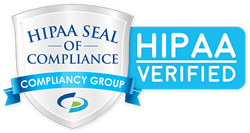With the proliferation of cyberattacks in recent years, cybersecurity has never been more important in the business world. Even just one successful attack is enough to devastate a business of any size. One of the scariest potential consequences of a cyberattack is identity theft. Fortunately, there are steps you can take to protect yourself, your staff, and your customers from having personal information compromised.
How To Protect Against Identity Theft
Identity theft is a serious problem that’s getting worse by the year. To avoid the repercussions of this type of cybercrime, you need to follow cybersecurity best practices. Before discussing the steps you can take to guard against identity theft, however, let’s first talk about what cyber identity theft is. The more you understand about the concept and how it works, the easier it is to stay secure.
Identity theft is a type of cybercrime where your personal and financial data is obtained without your permission. What this means is the hacker who stole this information has unauthorized access to things like Social Security Numbers (SSN), bank account numbers, credit cards, and more. Someone who has this kind of data can assume your digital identity and wreak a lot of havoc. For example, they could use your identity to open new bank accounts or apply for credit cards.
This type of cybercrime can be carried out in a variety of ways. From skimming—when a hacker tampers with an electronic card reader to steal card data—to stealing your wallet, there’s no shortage of attack methods. However, most of the damage is done through phishing emails and imposter phone calls.
While there’s no way to keep your business 100% protected from identity theft, there are steps you can follow to greatly lower your chances of it happening. Here are a few identity theft information security tips you can use to prevent cybercriminals from taking your sensitive information.
Be Cautious on How You’re Exchanging Information
In business, it’s not uncommon for employees to exchange confidential personal and corporate information. In fact, many companies request that new employees provide information like routing numbers and home addresses for direct payment on their first day. When this time comes, never do it over the phone or on a website. A skilled hacker can easily access these channels and steal whatever is being passed.
In addition, don’t blindly trust whoever is requesting the information. As mentioned earlier, one of the most common ways identities are stolen is through imposter phone calls and phishing emails. Always verify the legitimacy of the organization and the person asking for the information. If you’re in doubt, you can talk to a colleague or your manager about the request.
Keep an Eye on the URLs You’re Using
Depending on what your job is, you’ve likely filled out your fair share of online forms. Some of them may be questionnaires that want you to share your opinion, while others may be more formal. However, there are times when those forms may ask you to provide sensitive information.
If you ever have to fill out an online form, always take a moment to check the URL. The URL should have a “https://” and a padlock icon next to it. This is an indication that the website is secure. If it doesn’t have these elements, avoid it and investigate whether the form is legitimate.
Use Only Strong Passwords
Although they may be an annoyance, passwords play an important role in keeping your accounts safe. It can be tempting to create easy-to-remember passwords or reuse passwords you have for other accounts but doing so can negate the benefit of having a password. Creating a simple password or reusing a password makes the hacker’s job much easier.
Everyone in your organization should be creating strong passwords and changing them on a regular basis. You also want to avoid writing down and storing your passwords in your desk. If you’re worried about forgetting a password you created, you can always use a password manager. With a password manager, you can securely store all of your passwords in one place, so you only have to remember the one password you created to access the manager.
Limit the Amount of Personal Information You Share on Social Media
A hacker doesn’t necessarily have to hack anything to obtain personal data. You would be shocked by how much sensitive information people willingly give on their own social media accounts. That’s why a common identity theft tactic is combing through a person’s social media accounts.
Whether it’s Facebook, Twitter, or even LinkedIn, these applications and websites are rich with personal information. You could simply get rid of all your social media accounts, but it’s not necessary to take actions that are so drastic. Just make sure to scrub your accounts of any information that isn’t necessary for others to see.
Securely Dispose of Documents
Documents are a staple of business, and they often contain information that no one outside of the business should be privy to. Any documents that contain personal, company, and/or confidential information should be handled carefully. Additionally, they should always be stored in a safe place that only qualified workers have access to. When these documents are no longer needed, they should be disposed of in a secure way.
Get the Protection Your Business Needs
For the best in cybersecurity and identity theft protection, come to The Logic Group. We are an experienced managed services provider that offers customized full-service solutions. Through our advanced cybersecurity solutions—like dark web monitoring and managed next-gen firewall—we keep your network protected from even the worst cyberattacks.
Contact us today to learn more about our offerings.




